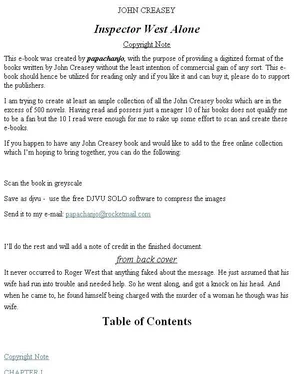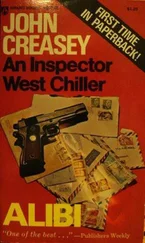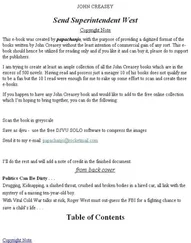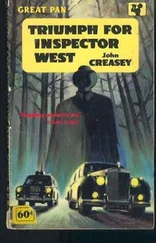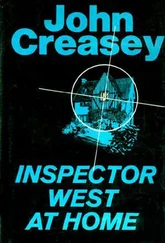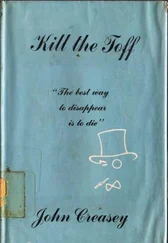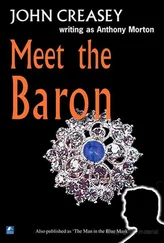John Creasey - Inspector West Alone
Здесь есть возможность читать онлайн «John Creasey - Inspector West Alone» весь текст электронной книги совершенно бесплатно (целиком полную версию без сокращений). В некоторых случаях можно слушать аудио, скачать через торрент в формате fb2 и присутствует краткое содержание. Жанр: Старинная литература, на русском языке. Описание произведения, (предисловие) а так же отзывы посетителей доступны на портале библиотеки ЛибКат.
- Название:Inspector West Alone
- Автор:
- Жанр:
- Год:неизвестен
- ISBN:нет данных
- Рейтинг книги:4 / 5. Голосов: 1
-
Избранное:Добавить в избранное
- Отзывы:
-
Ваша оценка:
- 80
- 1
- 2
- 3
- 4
- 5
Inspector West Alone: краткое содержание, описание и аннотация
Предлагаем к чтению аннотацию, описание, краткое содержание или предисловие (зависит от того, что написал сам автор книги «Inspector West Alone»). Если вы не нашли необходимую информацию о книге — напишите в комментариях, мы постараемся отыскать её.
Inspector West Alone — читать онлайн бесплатно полную книгу (весь текст) целиком
Ниже представлен текст книги, разбитый по страницам. Система сохранения места последней прочитанной страницы, позволяет с удобством читать онлайн бесплатно книгу «Inspector West Alone», без необходимости каждый раз заново искать на чём Вы остановились. Поставьте закладку, и сможете в любой момент перейти на страницу, на которой закончили чтение.
Интервал:
Закладка:
A man leapt at him from the corner behind the door.
CHAPTER XI
GINGER
WILD eyes burned in a pale face. An iron rod clenched in a claw-like hand brushed Roger’s shoulders as he swung to one side. The rod hit the door with a metallic clang, and clattered on the floor. Roger ducked and dodged, then went into the attack, striking out savagely.
Right to the stomach; left to the chin. The first blow brought forth a soughing groan, the second, a screech. The man backed away helplessly, banged against a chair and sprawled into it.
Roger closed the door, and listened intently. He could hear a typewriter, going at speed; that was distant, the only audible sound. The man in the chair sat up, licked his lips and put out a hand as if afraid of further violence.
“Can you give me one reason why I shouldn’t break your neck?” Roger growled. His voice was hard and grating, the voice he’d trained himself to acquire.
The man cowered back; hardly a hero. He wasn’t difficult to read. He had screwed himself up to make that assault, and when it had failed, courage went out of him like air from a punctured balloon.
He was thin, his pallor sickly. He needed a shave, and his gingery hair wanted cutting. His clothes were poor; navy-blue suit frayed at the cuffs, and a choker-scarf, not a collar and tie.
This was a waiting-room; the high, cream-washed walls were bare, and there were two leather arm-chairs and four good uprights, reproduction Hepplewhite. On a plain walnut table, a dozen new magazines were neatly placed; alongside it was a similar arrangement of trade periodicals. There was a faint smell, dry and not unpleasant, of distemper. Two doors led from here. One was marked: Inquiries: Please Ring, with a sign beneath a bell-push; the other, Charles Rayner , Private. There were frosted-glass panels in each.
“Why did you attack me?” Roger demanded, roughly.
“I—thought——” The man hesitated, thrusting out his hands appealingly. “You’re not the man I expected.”
“It would still have been murder.”
“I came to kill him.”
You couldn’t mistake the touch of dignity which came unexpectedly with the words; the man was proud of what he had come to do.
Roger said: “Stay there.” He turned, pushed open the inquiries door and saw a large office, with six or seven desks, three typewriters, several telephones, cabinets—a well-equipped place, where everything was new. There was a large cupboard, with hooks for hats and coats. He went back, gripped the ginger-haired man and took him into the room and locked him in the cupboard.
Another door led from this room—to the “Private” one. Roger opened it; the office beyond was sumptuous; more study than office, with a thick carpet, panelled walls, a library of books, and several easy-chairs. No one was here. He studied the ceiling and the panelled walls; a policeman again, knowing exactly what he wanted and knowing pretty well where to find it. He saw a small panel, one of several in the wall behind the desk, and prised it open with his fingers.
He grinned broadly; that was his first natural smile since he had left Scotland Yard.
Inside a foot-deep cavity was a tiny dictaphone recording outfit. He switched it off, using a pencil, and closed the panel. Then he scanned the ceiling and panelling again until he was sure there was no peephole through which he could be watched or heard. He went to the outer room. The ginger-haired man stepped meekly out of the cupboard.
“In here,” Roger said.
He locked the outer door with the key on the inside; there was no way of getting in except by the windows. These overlooked a blank wall, and the drop to the area below was sheer. He stood first at one side, then the other, to make sure that the office could not be overlooked. Finally, with the ginger-haired man gaping and nervous, he stood on a corner of the desk and examined the ceiling; no, there was no break to mar the white paper; no peephole through which he could be watched.
“Who did you expect to find?”
“Not—not you.”
“I’ve believed you, so far. Who did you want to kill?”
“Rayner,” said the ginger-haired man.
So he had inherited an enemy as well as a name.
“Why?”
“He killed my wife.”
“Murderers get hanged.”
“It wasn’t known as murder,” the ginger-haired man said wearily. “It just wasn’t discovered, but I knew. I was inside when it happened. He always told me he’d kill her if she wouldn’t do what he wanted. She didn’t, and he killed her.”
Was this another of Kennedy’s little tricks?
“I’m—Kyle,” the man muttered.
“Why did they put you inside?” Kyle, Kyle? The name was familiar, and rang a bell in his memory.
“Forgery,” Kyle said simply. “I’m an engraver. I’m a good engraver.” That incongruous hint of dignity came again. “My products were practically undetectable.”
That was true: yes, Kyle. He’d been caught and tried in Manchester. It was one of those cases in which a provincial force had stolen a march on the Yard. Eddie Day, purveyor of faked messages, had gone to Manchester to hold a watching brief for the Yard, and had come back shaken by the cleverness of the forgeries.
“When did you come out?”
“A month ago.”
“What have you been doing since?”
“Looking for Rayner.”
“Are you still on your ticket?”
“Yes, I report twice a week. I go to Bow Street while I’m in London.”
“What does this man, who calls himself Rayner, look like?”
The watery pale-blue eyes, with their pink lids and thin fair lashes, looked puzzled.
“Don’t you know?”
“I am Rayner.”
“No, no! You can’t be! You——”
“The other man used my name. What’s he like? What’s his most noticeable feature?”
Kyle said softly and in a voice which seemed to be filled with hatred:
“You would never forget Rayner. His eyes—how I hated his eyes. Denise did, too, although they fascinated her, she—she was attracted to him, but he frightened her. He wanted her to go with him and leave me. My pals told me that Rayner told her he would kill her if she didn’t go to him. She didn’t go. She was killed in—in an accident. Accident!” Shrillness put an edge to his voice, and his eyes blazed. “She was run down by a car, all her beauty spoiled. All her beauty.” He took a photograph from his pocket, and his fingers trembled. He stared down at it, and tears glistened in his eyes. He whispered: “Look!”
She was gay and smiling, a queen to this man’s slave. It was easy to believe that Kyle had worshipped her.
Roger said: “I can understand why you don’t like Rayner. Let me have a look at your wallet.”
“I—no!”
“Come on.”
Kyle handed it over, reluctantly. Roger shook the contents of the wallet on to the brown-leather surface of the desk. He saw the expected oddments: a ticket of leave, prison-discharge form, registration card—an old, tattered, dog-eared letter dated eight years ago, a ten-shilling note, and another photograph. He turned the photograph over. He knew that Kyle was watching him, jealously intent, and kept his face set.
It wasn’t easy, for this was the girl from Paris—Lucille.
He stared down at it, then at the picture of Kyle’s dead wife.
These were alike, with unmistakable family likeness.
* * * *
“You pick good lookers,” Roger growled, after a long pause.
“Please!” Kyle’s dignity rose again. “That is my daughter.”
“Sure?”
“I am quite sure,” said Kyle. “That is Lucille.” He gave a gentle smile. “Years ago, I sent her to France, to my wife’s family. I met Denise during the first Great War. Lucille was so good and clever, and I did not want her smeared with my reputation. My wife and I agreed it was best. We had anxious days during the last war, my wife suffered most, because I wasn’t there to help her bear her loneliness, but all was well, Lucille was in a country-district, no harm befell her.” The pedantic phrases had a touch of dreaminess.
Читать дальшеИнтервал:
Закладка:
Похожие книги на «Inspector West Alone»
Представляем Вашему вниманию похожие книги на «Inspector West Alone» списком для выбора. Мы отобрали схожую по названию и смыслу литературу в надежде предоставить читателям больше вариантов отыскать новые, интересные, ещё непрочитанные произведения.
Обсуждение, отзывы о книге «Inspector West Alone» и просто собственные мнения читателей. Оставьте ваши комментарии, напишите, что Вы думаете о произведении, его смысле или главных героях. Укажите что конкретно понравилось, а что нет, и почему Вы так считаете.
